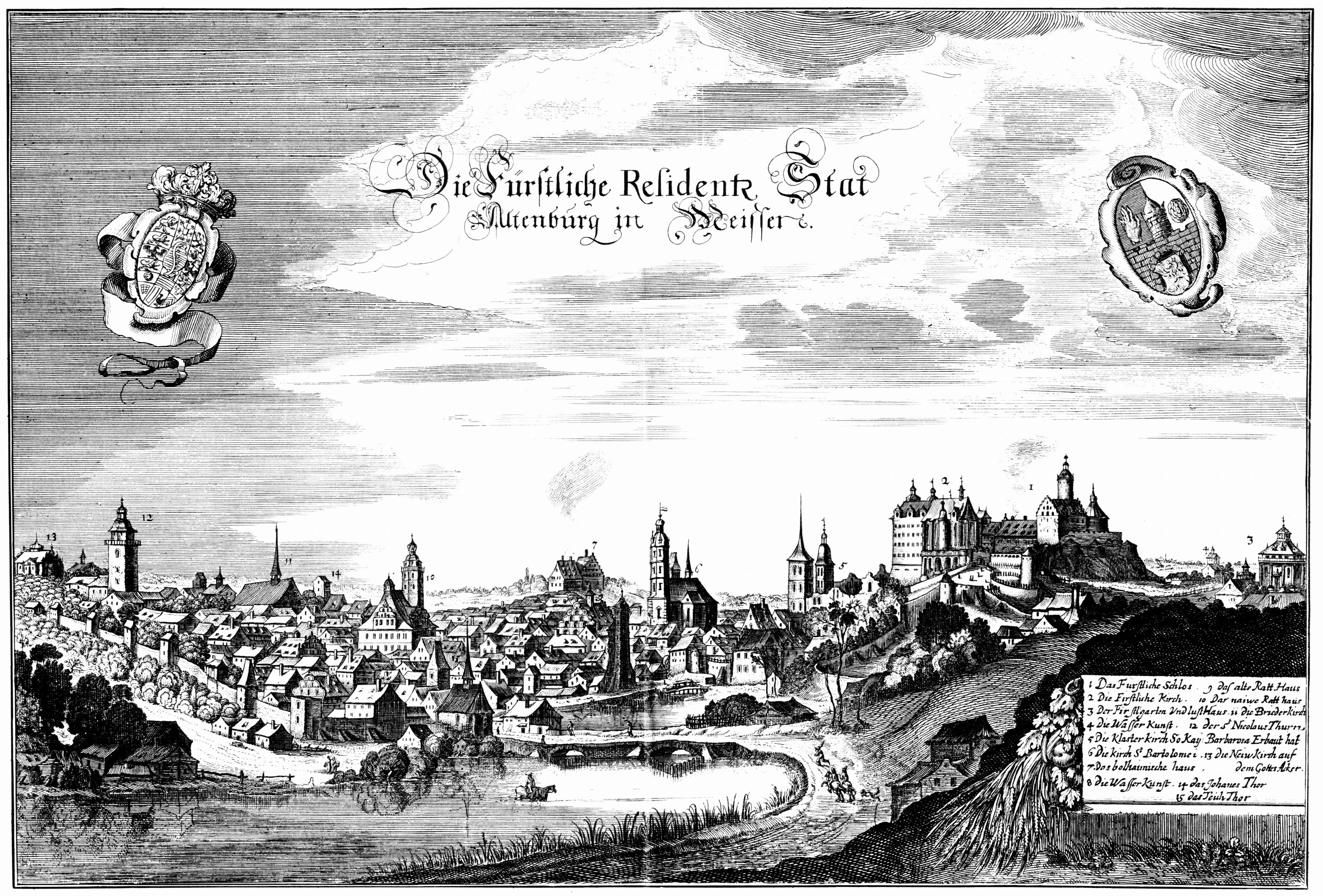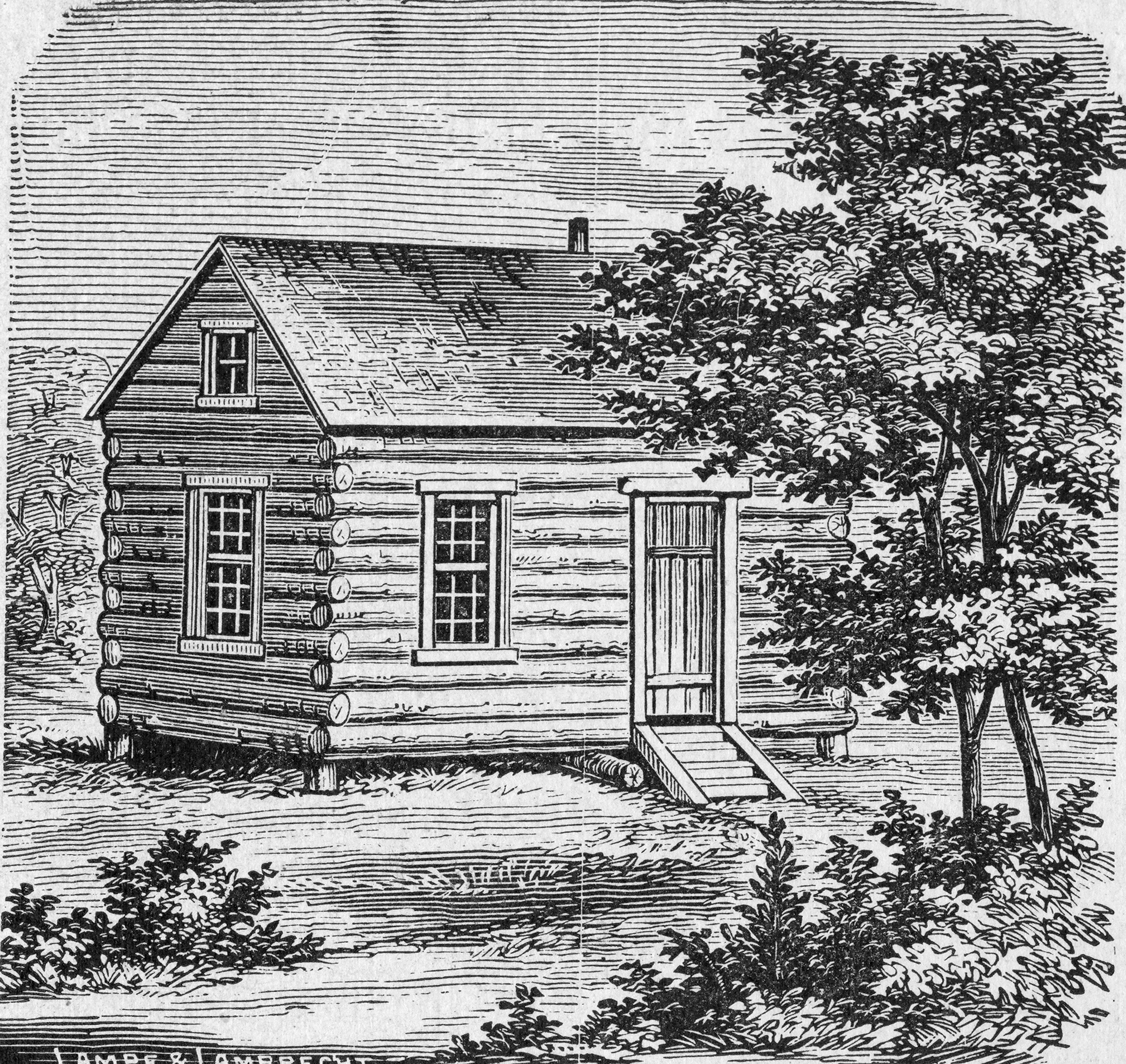|
Altenburg, Missouri
Altenburg is a city in Perry County, Missouri, United States. The population was 341 at the 2020 census. History Altenburg (German for "Old Castle") was laid out and platted in 1839 by a colony of Lutherans. It was named after the Duchy of Saxe-Altenburg from where many of its settlers came, and not the city of Altenburg which does not seem to have sent a single colonist. Altenburg is one of seven towns and villages in the area founded by German Lutheran immigrants in 1839. Altenburg and the other communities—Dresden, Frohna, Johannisberg, Paitzdorf, Seelitz, and Wittenberg—were all named by settlers for towns in the Saxony region of their native country. These settlers would form the backbone of what would later become the Lutheran Church–Missouri Synod. Trinity Lutheran Church was established in 1839 in a log cabin, and was later replaced by a limestone, and then a frame church. Soon after arriving, the immigrants constructed a school in Altenburg. Made of native ti ... [...More Info...] [...Related Items...] OR: [Wikipedia] [Google] [Baidu] |
City
A city is a human settlement of notable size.Goodall, B. (1987) ''The Penguin Dictionary of Human Geography''. London: Penguin.Kuper, A. and Kuper, J., eds (1996) ''The Social Science Encyclopedia''. 2nd edition. London: Routledge. It can be defined as a permanent and densely settled place with administratively defined boundaries whose members work primarily on non-agricultural tasks. Cities generally have extensive systems for housing, transportation, sanitation, utilities, land use, production of goods, and communication. Their density facilitates interaction between people, government organisations and businesses, sometimes benefiting different parties in the process, such as improving efficiency of goods and service distribution. Historically, city-dwellers have been a small proportion of humanity overall, but following two centuries of unprecedented and rapid urbanization, more than half of the world population now lives in cities, which has had profound consequences for g ... [...More Info...] [...Related Items...] OR: [Wikipedia] [Google] [Baidu] |
Altenburg
Altenburg () is a city in Thuringia, Germany, located south of Leipzig, west of Dresden and east of Erfurt. It is the capital of the Altenburger Land district and part of a polycentric old-industrial textile and metal production region between Gera, Zwickau and Chemnitz with more than 1 million inhabitants, while the city itself has a population of 33,000. Today, the city and its rural county is part of the Central German Metropolitan Region. Altenburg was first mentioned in 976 and later became one of the first German cities within former Slavic area, east of the Saale river (as part of the medieval Ostsiedlung movement). The emperor Frederick I, Holy Roman Emperor, Frederick Barbarossa visited Altenburg several times between 1165 and 1188, hence the town is named a Barbarossa city, Barbarossa town today. Since the 17th century, Altenburg was the residence of different House of Wettin, Ernestine duchies, of whom the Duchy of Saxe-Altenburg, Saxe-Altenburg persisted until th ... [...More Info...] [...Related Items...] OR: [Wikipedia] [Google] [Baidu] |
Concordia Log Cabin College (Altenburg, Missouri)
Concordia Log Cabin College is a historic site in Altenburg, in Perry County, Missouri. The structure is a log building under a protective shelter situated in the Trinity Lutheran Church maple grove. It served as the first college for the Lutheran Church–Missouri Synod and was first Lutheran college west of the Mississippi River. Today, it commemorates the German Lutheran migration of 1838–1839 and the founding of the Lutheran Church–Missouri Synod, and features two log cabins from that era. The building was listed on the National Register of Historic Places in 1978. Construction The log cabin dates to the first settlement of Altenburg, being constructed in 1839, to serve as the first school for the new community. It is now located in the maple grove across from the Trinity Lutheran Church and contains museum exhibits relevant to the history of Altenburg. It was moved to its present location in 1912; and the vertical oak timbers were attached to the walls to stabilize t ... [...More Info...] [...Related Items...] OR: [Wikipedia] [Google] [Baidu] |
Trinity Lutheran Church (Altenburg, Missouri)
Trinity Lutheran Church is a member congregation of the Lutheran Church–Missouri Synod (LCMS) in Altenburg, Missouri. History Trinity Church, originally known as Trinity Evangelical Lutheran Church, was the first Lutheran church in Altenburg, and was established by Gotthold Heinrich Loeber (1797-1849) in a log cabin in 1839. This log cabin, also utilized as a school building, was moved to a new site in 1912, and in 1979 was placed on the National Register of Historic Places. The cornerstone for the second church building was laid on March 14, 1844. This limestone building, which was both a school and a church, was completed in 1845, under Pastor Loeber. He helped start the Lutheran School and Seminary at Altenburg, which was functioning by 1841 and possibly as early as 1839. This school ultimately developed into Concordia Seminary. Carl Ferdinand Wilhelm Walther helped organize the Lutheran Church–Missouri Synod in 1847, was its first president, and was involved in the relo ... [...More Info...] [...Related Items...] OR: [Wikipedia] [Google] [Baidu] |
Lutheran Church–Missouri Synod
The Lutheran Church—Missouri Synod (LCMS), also known as the Missouri Synod, is a traditional, confessional Lutheran denomination in the United States. With 1.8 million members, it is the second-largest Lutheran body in the United States. The LCMS was organized in 1847 at a meeting in Chicago, Illinois, as the German Evangelical Lutheran Synod of Missouri, Ohio, and Other States (german: Die Deutsche Evangelisch-Lutherische Synode von Missouri, Ohio und andern Staaten), a name which partially reflected the geographic locations of the founding congregations. The LCMS has congregations in all 50 U.S. states and two Canadian provinces, but over half of its members are located in the Midwest. It is a member of the International Lutheran Council and is in altar and pulpit fellowship with most of that group's members. The LCMS is headquartered in Kirkwood, Missouri, and is divided into 35 districts—33 of which are geographic and two (the English and the SELC) non-geographic. The cur ... [...More Info...] [...Related Items...] OR: [Wikipedia] [Google] [Baidu] |
Saxony
Saxony (german: Sachsen ; Upper Saxon: ''Saggsn''; hsb, Sakska), officially the Free State of Saxony (german: Freistaat Sachsen, links=no ; Upper Saxon: ''Freischdaad Saggsn''; hsb, Swobodny stat Sakska, links=no), is a landlocked state of Germany, bordering the states of Brandenburg, Saxony-Anhalt, Thuringia, Bavaria, as well as the countries of Poland and the Czech Republic. Its capital is Dresden, and its largest city is Leipzig. Saxony is the tenth largest of Germany's sixteen states, with an area of , and the sixth most populous, with more than 4 million inhabitants. The term Saxony has been in use for more than a millennium. It was used for the medieval Duchy of Saxony, the Electorate of Saxony of the Holy Roman Empire, the Kingdom of Saxony, and twice for a republic. The first Free State of Saxony was established in 1918 as a constituent state of the Weimar Republic. After World War II, it was under Soviet occupation before it became part of the communist East Ger ... [...More Info...] [...Related Items...] OR: [Wikipedia] [Google] [Baidu] |
Wittenberg, Missouri
Wittenberg is an unincorporated community in Brazeau Township in eastern Perry County, Missouri, United States. It is located on the Mississippi River, southeast of Perryville. Wittenberg is situated in the Brazeau Bottoms on Brazeau Creek opposite Grand Tower, Illinois, and Tower Rock, the latter a landmark island in the Mississippi River. History Wittenberg is one of seven towns and villages in the area founded by German Lutheran immigrants in 1839. Wittenberg and the others—Altenburg, Dresden, Frohna, Johannisberg, Paitzdorf, and Seelitz—were all named by settlers for towns in the Saxony region of their native country. The city's namesake, Wittenberg, Germany, is important in Lutheran history as the place where Martin Luther posted the ''Ninety-five Theses'', which sparked the Reformation. The immigrant group would eventually form the backbone of the Lutheran Church–Missouri Synod, and they considered Tower Rock, nearby in the Mississippi River, to be their own ... [...More Info...] [...Related Items...] OR: [Wikipedia] [Google] [Baidu] |
Seelitz, Perry County, Missouri
Seelitz is an abandoned village in Brazeau Township in Perry County, Missouri, United States. Name Seelitz was named after Seelitz in Saxony, Germany.State Historical Society of Missouri: Perry County Place Names http://shs.umsystem.edu/manuscripts/ramsay/ramsay_perry.html History Seelitz was a short-lived town near Altenburg, one of the seven colonies established in 1839 in the Saxon Migration. Pastor Ernst Moritz Bürger was the Lutheran pastor of the village. Seelitz was settled by people from Bürger's congregation in Germany and from that of his father. Although only one of the colonists is recorded as coming from the small parish of Seelitz, which is near Rochlitz in the Zwickauer Mulde valley, Bürger may have chosen it out of filial piety and the memory of his own first pastorate, rather than Lunzenau Lunzenau () is a town in the district of Mittelsachsen, in Saxony, Germany. It is situated on the river Zwickauer Mulde, 16 km west of Mittweida, and 18 ... [...More Info...] [...Related Items...] OR: [Wikipedia] [Google] [Baidu] |
Uniontown, Missouri
Uniontown is an unincorporated community located in Union Township in southeastern Perry County, Missouri, United States. It is situated on U.S. Route 61, ten miles southeast of Perryville. Etymology Uniontown was originally known as Paitzdorf, and was named after the same village in Greiz county in Thuringia, Germany, from where many of the settlers originated. However, Paitzdorf became known as Uniontown during the Civil War era, as it served as an encampment for Union soldiers. The Union soldiers could not pronounce the name of the town, and therefore referred to it as Uniontown. History Originally known as Paitzdorf, Uniontown is one of seven towns and villages in the area founded by the Rev. C. F. Gruber Auswanderung (Emigration) Group of Saxon-German immigrants in 1839. Paitzdorf and the others -- Altenburg, Dresden, Frohna, Johannisberg, Seelitz, and Wittenberg—were all named by settlers after towns in the Saxony Saxony (german: Sachsen ; Upper Saxon: ''Saggs ... [...More Info...] [...Related Items...] OR: [Wikipedia] [Google] [Baidu] |
New Wells, Missouri
New Wells is an unincorporated community in northern Cape Girardeau County, Missouri, United States. It is located north of Cape Girardeau and is part of the Cape Girardeau–Jackson, MO- IL Metropolitan Statistical Area. Demographics Etymology The source of the original name Johannisberg remains something of a mystery. There are many German places by that name, but none of them is listed as the original home of any of the Saxon colony that came to Perry County. It is not likely to have been the well-known Johannisberg on the Rhine, which is a Catholic stronghold, nor is it likely to have been Johannisberg in East Prussia, which also would not have had any connection with the Saxons. Austrian settlers referred to the community as Neu Wels, after the city in Austria, which was later Americanized to ''New Wells''. History Johannisberg was one of the seven colonies established in 1839 in the Saxon Migration to Perry County, Missouri. Johannisberg is said to have been an of ... [...More Info...] [...Related Items...] OR: [Wikipedia] [Google] [Baidu] |



